By Dina Eliash RobinsonIf your naturally cheerful disposition slides into depression as soon as daylight hours are shortened by longer nights or darkened by frequently overcast skies, you might be one of about 25 million Americans afflicted with Seasonal Affective Disorder (SAD). An acute response to sunlight deprivation and prolonged darkness during winter and rainy months, SAD also affects countless Scandinavians and other populations of Northern and gloomy climates–such as the American Pacific North-West.
More sufferers of SAD are found among those who spend their days cooped up in windowless workplaces, submariners on long deployments, night-shift workers, many elderly or disabled people with too little access to the outdoors during daylight hours—and even among party animals who spend much of their lives in darkened nightclubs and bars.
Long before the syndrome had a name, its cause was well known and treated with various remedies devised and practiced to relieve the debilitating depression it caused. Most of those remedies are still in use, such as sunlamp treatments, LED-powered visors designed to illuminate areas around the wearers’ faces and the flooding of homes and workplaces with bright artificial light.
Cave dwellers are believed to have been the earliest humans who discovered that eating more fatty animal protein and starchy or sweet carbohydrates was a good pick-me-up combination whenever winter or volcano ash turned days into nights.
Centuries later, we are still trying to kick the blues by self-medicating with similar protein and carbs combos that are now known as comfort foods. Some of the main reasons they are not hitting the desired mark, however, are due to current (conventional) food production practices, which consist of both plants and protein being loaded with toxic chemicals, depleted of nutrients by processing and genetically modified into (increasingly known to be unsafe) “Frankenstein” facsimiles better known as junk (omission intended, since qualifying these as ‘food’ would be misleading).
Weight gain snuck up on modern societies as they continued to fight the winter blues with calorie-rich comfort foods but without the physical effort that once helped their prehistoric ancestor to survive. This is quite evident in the ample figures portrayed in the classical paintings of the 16th, 17th, 18th and 19th centuries by Dutch, German and other North European masters.
Being an addictive portal to cravings for ever-larger portions, as well as for salt and sugar, junk food accelerated weight gain in modern populations. And because of its tantalizing marketing and ubiquitous presence within arms’ reach (again, requiring none of the physical effort prehistoric humans had to spend hunting and gathering), junk food also became one of the main causes of today’s epidemic of depression-linked obesity and many of the diseases associated with it.
In short, today’s junk food is neither comforting, nor effective in counteracting the emotional lows of SAD. What’s more, no supersized bag of chips or gallon container of ice cream has the necessary ingredients to relieve life’s beat-downs—such as lovers’ breakup, job loss, bereavement, financial crisis or other sources of fear and stress.
The most efficient way to boost the brain’s ability to generate positive emotions is, as prehistoric humans discovered (probably by accident), by eating certain combinations of toxin-free, wholesome foods—which, in today’s tainted environment, means mostly organic products.
Serotonin To The Rescue
Years of investigation by international researchers have shown a strong connection between depression and inadequate levels of serotonin in the brain. A chemical neurotransmitter, serotonin is the key to helping us feel good, sleep well, learn and memorize, maintain a healthy sex drive, control our social behavior, regulate our body temperature and possibly even live longer.
Because crossing the body-brain barrier is a complicated process, shortcuts such as supplements and prescription antidepressants have been developed to do the job. Taking either requires medical supervision since neither is completely safe or effective. While supplements have limited—and often hit-or-miss—effects, antidepressants are frequently hampered by biological incompatibility with patients’ bodies or needs, their effectiveness is often minimal or temporary, and all have toxic side-effects.
The Food Solution
There is by now plenty of evidence that the most effective means to achieving the mysterious alchemy that boosts the brain’s serotonin levels in the safest, longest lasting and most enjoyable way, is to regularly consume serotonin-conducive foods that include carbohydrates and proteins rich in iron, riboflavin, vitamin B6 and the amino acid tryptophan, from which serotonin is synthesized. You may remember tryptophan as the protein-synthesizing amino acid because of which Thanksgiving turkey is blamed for the nearly catatonic post-feast siesta no one seems able to resist.
Admittedly, using food to boost the brain’s mood-elevating chemistry requires a little patience and strong resolve to follow a serotonin-increasing diet, not only until positive results kick in (usually from 2 to 10 days), but to make it a habit, so healthy levels of this neurotransmitter can be maintained in the brain, to act as a protective shield against dark thoughts, insomnia and other
symptoms of SAD and depression.
What’s more, in order to assure that emotional wellbeing and resilience are not interrupted or sabotaged, it is important to avoid sugar—especially in the form of pancreas-walloping high fructose corn syrup, but also including sweetened and chemical-laden junk food and alcohol. And since alcohol is also a depressant, it is best avoided by people struggling to keep SAD and other moodiness at bay; and certainly when good judgment is required (i.e. never before driving, etc.). Otherwise, moderation and commonsense about place, occasion and timing are good tips to follow.
What, How & When?
The following is a guide to serotonin-producing foods and combinations, as well as to the timing of meals proven to be most conducive to boosting the levels of this neurotransmitter in the brain:
- Make sure to eat plenty of foods that contain B Vitamins, since they are critical to brain health and the production of neurotransmitters—such as serotonin. They include thiamine (Vitamin B1), riboflavin (Vit. B2), pyridoxine (Vit. B6), Vitamin D, folic acid,

selenium, calcium and magnesium.
These substances often overlap in combinations of various (all organic) foods, among them:
- whole grain cereals (oatmeal is especially nutritious)
- breads and other baked goods—for weight loss or maintenance, lower calorie wheat germ can be used, with Stevia as sweetener
- cooked brown rice
- potatoes (most effective when baked with skin on)
- kidney- and black beans
- poultry
- bananas
- eggs—(Note: egg whites alone are not quite as rich in protein as whole eggs, but still a good source of it. Avoid frying. Cook on low heat and add a few drops of water to olive oil while sautéing or scrambling. Best to combine with tomatoes, peppers, mushrooms, spinach, kale, herbs, spices, etc.)
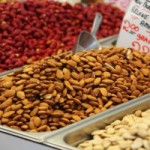
- almonds (and almond milk), walnuts, cashews and many other nuts and seeds.
(NOTE: Peanuts are legumes, not nuts and often trigger dangerous allergenic reactions—suspected to be caused by certain mold(s) ubiquitous in peanut growing soils.)
- Raw carrots, raisins, avocado and apple are among foods rich in magnesium (another essential serotonin-builder)
- Brussels sprouts—one of nature’s top super-foods—kale, spinach and salad greens are most important because of their abundance of essential fatty acids—such as alpha-linoleic acid (ALA), which, according to Dr. Frank Sacks, professor of Cardiovascular Disease and Prevention at the Harvard School of Public Health, is vital to proper brain function.
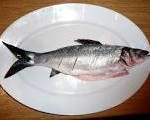 Fatty fish, like wild-caught salmon, are rich in EPA (eicosapentaenoic acid) and DHA (docosahexanoic acid)—all essential nutrients for healthy brain maintenance.
Fatty fish, like wild-caught salmon, are rich in EPA (eicosapentaenoic acid) and DHA (docosahexanoic acid)—all essential nutrients for healthy brain maintenance.- The amino acid L-Theanine is plentiful in green tea and credited with boosting alpha waves in the brain, with the interesting property of working both as a relaxant while also fueling alertness.
- Vitamin B6-rich foods include—in addition to several listed above with overlapping ingredients—
== organic leafy greens (spinach, turnip greens, mustard greens, celery, etc.)
== organic chicken and turkey; etc.
== wild caught sardines, herring, salmon and other small and medium size fish.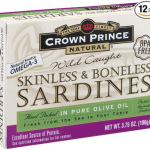
(Note: Look for marine foods caught in the least polluted waters and least tainted with toxic mercury.)
(Find more options by searching this site or e-mailing us your questions to [email protected] for more information.)
- Protein—especially foods with highest tryptophan contents—is an essential component for boosting serotonin levels in the brain. Useful tip: Eat small portions of protein three times a day to help the body absorb the necessary levels of its essential B vitamins and nutrients.
But here is the caveat: This works only when the protein-rich foods are combined with vegetables. The reason? Due to another biochemistry quirk, eating protein with carbohydrates actually inhibits the production of serotonin. (While vegetables also contain carbs, these are absorbed by the body very slowly. Mysteriously, this slow-mo process actually enhances, rather then obstructs the protein’s serotonin uptake into the 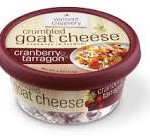 brain.)
brain.)
- In addition to the above-mentioned tryptophan-rich foods, wild-caught deep-sea scallops and small and medium size fish also help assemble the serotonin combo—as are sunflower and pumpkin seeds and goat dairy. The latter is much preferred to cow products that tend to provoke allergies or lactose intolerance; as well as having higher cholesterol content while also lacking the beneficial digestive enzymes present in goat dairy.
(Note: Shrimp, while a rich source of protein and phosphorus, is also very high in cholesterol and not recommended for people with high blood pressure or cardiovascular disease.)
Worth noting is that merely increasing the amount of animal protein in one’s diet will not boost serotonin levels in the brain. Because of another 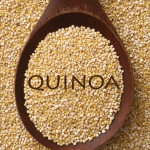 biochemistry quirk, the tryptophan in animal fat actually competes with other amino acids to reach the brain, but for some reason, it always loses that race. In short, more is not always better. Small portions eaten frequently works best.
biochemistry quirk, the tryptophan in animal fat actually competes with other amino acids to reach the brain, but for some reason, it always loses that race. In short, more is not always better. Small portions eaten frequently works best.
- While organic grains, such as rice and wheat, are great serotonin-producing carbohydrates, so are various grain-like (often nutty tasting) seeds—amaranth, buckwheat, millet and quinoa among them. Quinoa is also useful as an alkaline food that can rebalance body chemistry after consuming foods or meals with high acid content. These B-vitamin-rich, grain-like seeds offer delicious gluten-free and non-allergenic alternatives to people sensitive to certain or all grains.
Nutrition experts suggest eating organic grain-like seeds with vegetables or seaweed for strong serotonin-producing combination. These have also 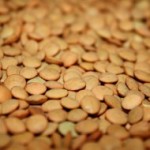 proven to be most effective when consumed in late afternoon or as part of early evening meals, when blood sugar levels tend to be low. Such combinations and timing are not only positive mood-boosters, but also help prevent overeating and are conducive to better sleep that night.
proven to be most effective when consumed in late afternoon or as part of early evening meals, when blood sugar levels tend to be low. Such combinations and timing are not only positive mood-boosters, but also help prevent overeating and are conducive to better sleep that night.
 Whenever possible, include fermented foods with probiotic qualities in your meals to enhance digestion and the assimilation of B Vitamins and other serotonin-producing nutrients. Probiotics have also been found to strongly boost the amount and quality of
Whenever possible, include fermented foods with probiotic qualities in your meals to enhance digestion and the assimilation of B Vitamins and other serotonin-producing nutrients. Probiotics have also been found to strongly boost the amount and quality of
nutrients in most foods.
Bottom Line
Needless to say, combining serotonin-boosting foods with endorphins-boosting exercise provides an even quicker way to kick SAD and other depression symptoms out of your life. They are also less expensive, safer, healthier and predictable—i.e. lasting as long as  you practice them—than experimenting with prescription drugs and juggling side effects.
you practice them—than experimenting with prescription drugs and juggling side effects.


2 Comments on “Foods That Banish The Winter Blues”
Thank you again for this well researched and insightful article! My husband and I look forward to each new post, as we always learn something about the benefits of certain foods in our diets. We also learned about certain food combinations (such as protein with carbohydrates) that should be avoided.
Thank you for all you do to keep us healthy!
Pingback: Brain Foods For Healthy Mind, Memory And Clear Thinking - FreeRangeClub